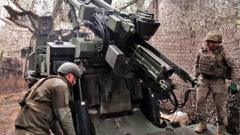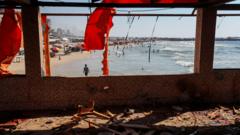As the conflict continues to rage, combatants express cautious optimism over possible diplomatic discussions while mourning the relentless toll of war.
**Hopes and Fears: Ukraine Soldiers Anticipate Talks with Russia Amidst Ongoing Conflict**

**Hopes and Fears: Ukraine Soldiers Anticipate Talks with Russia Amidst Ongoing Conflict**
Ukrainian frontline soldiers grapple with loss and the prospect of negotiations with Russia.
In the eastern city of Pokrovsk, Ukrainian soldiers monitor the frontline through drone footage, overseeing intense battles as their comrades confront Russian forces. The imagery of destruction unfolding onscreen starkly illustrates the devastating consequences of the prolonged conflict, which has claimed countless lives, further described by U.S. President Donald Trump as a "never-ending bloodbath."
Amidst the chaos, soldiers like "Kozak"—who aids the 155th mechanised brigade—reflect on the toll of war. Although skepticism exists from those who have seen hope for peace evaporate time and again, there are whispers of cautious optimism following renewed talks between Russia and Ukraine for the first time in three years. Kozak acknowledges the growing pressure on Russia to engage diplomatically, expressing hope it may mark "the beginning of the end of the war."
Yurii, a 37-year-old whose life drastically changed since the invasion began, shares that while soldiers long for an end to the fighting, they remain wary of offering any territory to Russia. "We did not start this war," he states firmly, as they observe enemy movements on their monitors, relaying critical intelligence back to their artillery units.
The reality of frontline combat continues to adapt with changing warfare technology, including increasingly dangerous drones. As Ukrainian forces maneuver to maintain their positions, the sound of incoming artillery underscores the stakes of the ongoing battle, and the need for military support from allies grows ever more urgent.
Discussion of potential territorial concessions to ensure peace ignites strong emotions among the troops. Yurii candidly expresses the personal cost of this war as he yearns to return to his family, while Kozak argues that any concessions might only lead to future conflict. "They will return," he warns, emphasizing their commitment to preserving their land.
In the shadow of loss, the impact of the war is inescapable throughout Ukraine. Yana Melnikova visits her son Vladislav's grave, a poignant representation of mourning on the homefront. As she leaves offerings at the resting place of her 22-year-old son, killed in combat, she voices a deep skepticism about the prospect of peace talks, perceiving them as mere rhetoric against Putin’s relentless territorial ambitions.
For Yana, the thought of yielding any part of Ukraine for a peace deal is unfathomable. "I want to live in Ukraine, not Russia," she declares, fueled by the brutal realities experienced under occupation. Amid her tears, she conveys her hope that her son's sacrifice will be honored with a future where Ukraine stands free and independent.
Amidst the chaos, soldiers like "Kozak"—who aids the 155th mechanised brigade—reflect on the toll of war. Although skepticism exists from those who have seen hope for peace evaporate time and again, there are whispers of cautious optimism following renewed talks between Russia and Ukraine for the first time in three years. Kozak acknowledges the growing pressure on Russia to engage diplomatically, expressing hope it may mark "the beginning of the end of the war."
Yurii, a 37-year-old whose life drastically changed since the invasion began, shares that while soldiers long for an end to the fighting, they remain wary of offering any territory to Russia. "We did not start this war," he states firmly, as they observe enemy movements on their monitors, relaying critical intelligence back to their artillery units.
The reality of frontline combat continues to adapt with changing warfare technology, including increasingly dangerous drones. As Ukrainian forces maneuver to maintain their positions, the sound of incoming artillery underscores the stakes of the ongoing battle, and the need for military support from allies grows ever more urgent.
Discussion of potential territorial concessions to ensure peace ignites strong emotions among the troops. Yurii candidly expresses the personal cost of this war as he yearns to return to his family, while Kozak argues that any concessions might only lead to future conflict. "They will return," he warns, emphasizing their commitment to preserving their land.
In the shadow of loss, the impact of the war is inescapable throughout Ukraine. Yana Melnikova visits her son Vladislav's grave, a poignant representation of mourning on the homefront. As she leaves offerings at the resting place of her 22-year-old son, killed in combat, she voices a deep skepticism about the prospect of peace talks, perceiving them as mere rhetoric against Putin’s relentless territorial ambitions.
For Yana, the thought of yielding any part of Ukraine for a peace deal is unfathomable. "I want to live in Ukraine, not Russia," she declares, fueled by the brutal realities experienced under occupation. Amid her tears, she conveys her hope that her son's sacrifice will be honored with a future where Ukraine stands free and independent.



















